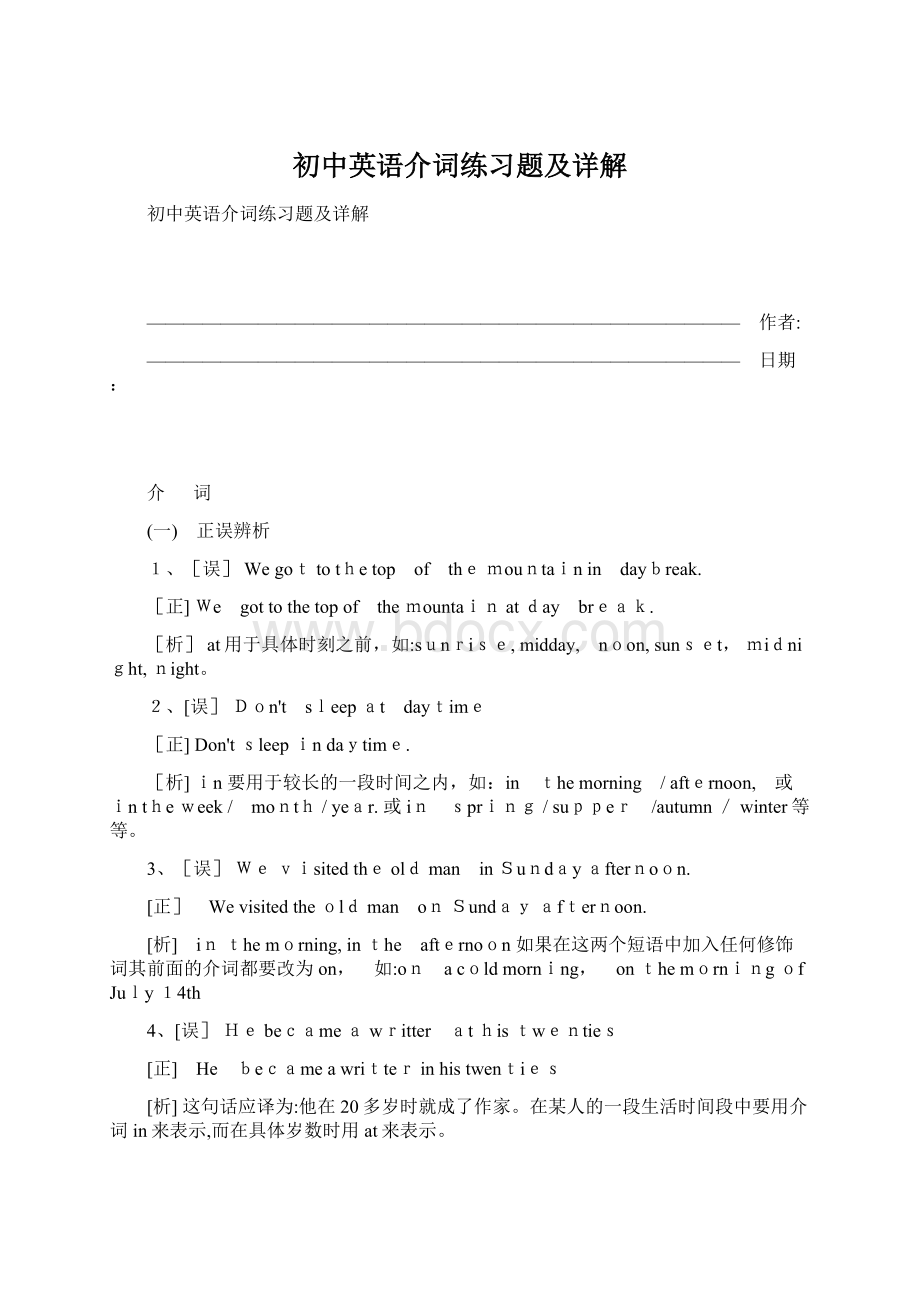初中英语介词练习题及详解.docx
《初中英语介词练习题及详解.docx》由会员分享,可在线阅读,更多相关《初中英语介词练习题及详解.docx(16页珍藏版)》请在冰豆网上搜索。

初中英语介词练习题及详解
初中英语介词练习题及详解
———————————————————————————————— 作者:
———————————————————————————————— 日期:
介 词
(一) 正误辨析
1、[误]Wegottothetop of themountainin daybreak.
[正]We gottothetopof themountainatday break.
[析]at用于具体时刻之前,如:
sunrise,midday, noon,sunset,midnight,night。
2、[误]Don't sleepat daytime
[正]Don'tsleepindaytime.
[析]in要用于较长的一段时间之内,如:
in themorning /afternoon, 或intheweek/ month/year.或in spring/supper /autumn/winter等等。
3、[误]Wevisitedtheoldman inSundayafternoon.
[正] Wevisitedtheoldman onSundayafternoon.
[析] inthemorning,inthe afternoon如果在这两个短语中加入任何修饰词其前面的介词都要改为on, 如:
on acoldmorning, onthemorningofJuly14th
4、[误]Hebecameawritter athistwenties
[正] He becameawritterinhistwenties
[析]这句话应译为:
他在20多岁时就成了作家。
在某人的一段生活时间段中要用介词in来表示,而在具体岁数时用at来表示。
5、[误]Hewent toNew Yorkto find ajobinsixteen yearsold.
[正]HewenttoNew Yorktofinda jobat sixteen.
[析]在具体年岁前用at,如:
attheageof12,atyour age,等等。
6、[误] Wewenttoswimintheriverin averyhotday.
[正] Wewent toswimintheriverona veryhot day.
[析]具体某一天要用介词on,又如:
onNewYear'sDay
7、[误]I'mlookingforwardto seeing youonChristmas.
[正]I'mlookingforwardto seeing youatChristmas.
[析]在节日的当天用on,而全部节日期间用at,Christmas是圣诞节期间,一般要有两周或更长的时间。
8、[误]Ihaven'tseeyouduringthesummerholidays.
[正] Ihaven'tseenyousince thebeginningof thesummerholidays.
[析]during表示在某一段时间之内,所以一般不与完成时搭配,如:
I visitedalotofmuseumsduringtheholiday.而for表示一段时间,可以用于完成时,如:
Ihaven'tseeyouforalong time.而through 用来表示时间时则为"整整,全部的时间"。
如:
Itrainedthroughthenight.而since则是表达主句动作的起始时间,一般要与完成时连用。
9、[误]Atenteringtheclassroom,Iheardthegoodnews.
[正]On enteringtheclassroom,I heardthegoodnews.
[析]On加动名词表示"一……就"。
本句的译文应是:
我一进入教室就听见这个好消息了。
又如:
onhearing…一听见,onarrival 一到达就……(on表示动作的名词)
10、[误]Inthe beginningofthebook,therearesomeinteresting stories.
[正]Atthebeginning of thebook,therearesomeinterestingstories.
[析]atthebeginning与atthe end都是指某事物的开始与结束部分,均不指时间范围,而inthe beginning则是指开始一段时间。
in theend=atlast是指"最终,终于"之意。
11、[误]Till the endofnextweek.Iwillhavefinishedthiswork.
[正] Bytheendofnextweek. Iwill have finishedthiswork.
[析]by引起的时间状语表示了动作的截止点,其意思为"不迟于某一时刻将工作做完",所以主句一般是完成时态。
当然可以有将来时态,如:
I'llbethere byfiveo'clock.而till则表达其一动作一直持续到某一时刻,但句中的动词一定要用持续性动词,而瞬间的截止性动词应用其否定句式,如:
Iwon't finishthisworktill(until) nextweekend.
12、[误]HecametoLondonbeforelastweekend.
[正]Hehad cometoLondon beforelastweekend.
[正]He cametoLondon twoweeks ago.
[析]before一般要与完成时连用,而ago则与一般过去时连用。
13、[误] Ihave studiedEnglishforthreeyearsginceI hadcomehere.
[正]Ihavestudied EnglishforthreeyearssinceIcamehere.
[析] since用来表达主句动作的开始时间,所以其引出的从句中应为过去时,而不能用完成时态
14、[误] Icanhelpyourepairthisbike.Youwill getitaftertwohours.
[正]Icanhelp you repairthisbike.Youwillgetitintwo hours.
[析]中文经常讲两小时之后来取,两天内会修好,而这个介词在英文中要用in而不要用after。
其原因有二,①after多用于过去时,如:
I arrivedin NewYork.After three days,Ifoundajobin thebank.②after加时间是表达一个不确定的时间范围,如:
afterthreedays, 即三天之后的哪一天都可以。
所以在许诺若干时间内会完成某事时,一定要用介词in。
15、[误]Threedaysafterhedied.
[正]Afterthree dayshedied.
[正]Three dayslater hedied.
[析]after 与later都可以用来表达一段时间之后,但它们所处的位置不同,after 在时间词前,而later在时间词后。
16、[误]Shehid herself after thetree.
[正]Shehidherself behindthetree.
[析]after多用来表达某动作之后,所以有的语法书中称它为动态介词,如:
Irun afterhim. Afterfinishingmy homework,Iwenttosee afilm.而behind则多用于静态事物之后。
17、[误]Thereisabeautifulbirdonthetree.
[正] Thereisabeautiful birdinthetree.
[析] 树上长出的果实,树叶要用on,而其他外来的人、物体均要用inthetree.
18、[误]Shanghai ison theeastofChina.
[正]Shanghaiisintheeastof China.
[析] 在表达地理位置时有3个介词:
in, on, to。
in表示在某范围之内;on表示与某地区接壤;to则表示不相接。
如:
Japanisto theeast ofChina.
19、[误] Iarrived at NewYorkonJuly2nd.
[正] IarrivedinNew YorkonJuly2nd.
[析]at用来表达较小的地方,而in用来表达较大的地方。
at常用于attheschoolgate,athome, atabusstop,atthestation,atthecinema,atasmallvillage。
20、[误]He lived inNo.3Beijing Road.
[正]Helivedat No.3Beijing Road.
[析]在门牌号码前要用at,并要注意它的惯用法:
atthe endofthestreet,at thefoot ofthe mountain,at the topof thepage。
21、[误]ThereisacolourTVsetatthe corner of thehall.
[正] Thereisa colourTVset inthecorner ofthehall.
[析]在屋内的角落应用in,而墙的外角用at,如:
Thereis atree at thecornerofthestreet.
22、[误]ThisweekendI'llstayinUncleWang's.
[正]This weekendI'll stay at UncleWang's.
[析] 要注意英文的特殊表达法,如:
ata tailor's shop(裁缝店)=at atailor's,atthedoctor's(去看病) atthebookseller's(在书店) atuncleWang's (在王叔叔家)
23、[误]Doyouknowthere is somegood newsontoday'snewspaper?
[正] Do youknowthereis somegoodnews intoday's newspaper?
[析]在报纸上的新闻要用in, 而在具体某一版上,或某一页上则要用on。
24、[误]TheschoolwillbeginonSeptember1st.
[正] Schoolwillbegin onSeptember1st.
[析]这里的school应看作不可数名词泛指学校的课程,即开学之意。
要注意,有些活动场所当表达正在从事该种活动时不要加冠词,如:
attable(吃饭),WhenIcametoTom'shome,theywere attable. 还有:
atdesk (学习),atwork(工作)atschool(上学),inhospital (住医院)at church作礼拜如加上定冠词则另有他意,如:
attheschool即在学校工作或办事,inthehospital即在医院工作或去看望病人。
25、[误]Inmy waytothestation,Ibought anewspapertokilltime.
[正]Onmywaytothestation,Iboughtanewspapertokill time.
[析]译文为:
在去车站的路上我买了份报纸,为的是消磨时光"在……的路上"应用onone's way…。
而inthe way有挡道之意,如:
Pleasemovethe chairitisin theway。
26、[误]Look,the doorisopen,Maybesomeonebroke into.
[正]Look,the doorisopen,Maybesomeonebrokein.
[正] Look, thedooris open,Maybesomeonebrokeintotheoffice.
[析]in是表达一个静止状态,在与break连用时其后不加介词宾语,而into则是动态介词,与break连用时要加介词宾语。
27、[误] I'llleaveBeijingtoShanghaitomorrow.
[正] I'llleave Beijingfor Shanghai.
[正]I'llleave forShanghai.
[析]leave for是离开某地去某处的固定搭配,不可将for改为别的介词。
这样的搭配还有:
startfor动身前往某处,setoutfor,sailfor。
28、[误]I'msorry.Ihaveto getoutthebusatnextstop.
[正]I'msorry. Ihaveto getoutof the busatnext stop.
[析]get in,与getout是两个相反的词组。
getin为上车,而getout为下车,但语法家认为这里的in与out为副词,所以其后不能接名词,我们可以讲We'dbettergetin.或We'd betterget out.还有一组词组有关上下车:
geton/off(atrain,aship,astruck)getinto/outof(acar,taxi…)
29、[误]BecarefulThe temperatureof thewateris ninetydegreesover zero.
[正]Becareful.Thetemperature ofthe wateris ninety degreesabovezero.
[析]over与above在作为比某物高的意思时有时可以互换。
但在垂直方向上的高矮时,即正上方时则要用above.而泛指上方时用over.
30、[误]Thereisanoldstone bridgeabovetheriver.
[正]Thereisanoldstonebridgeoverthe river.
[析] over还有一意为"跨越,横跨"。
31、[误]TheDeadSea isunderthe sea level.
[正]TheDeadSea isbelowthesea level.
[析]在垂直下方要用below.也就是讲above与below互为反意词,over与under也是反意词。
32、[误] Thereisabigtree inthefrontofthehouse.
[正]There isabigtree infrontofthehouse.
[析]infrontof是在物体外部的前面,而in thefront of是在物体内部的前面,如:
Thedriver sits inthefrontofthebus.
33、[误]Ittook themtwo daystowalkacrosstheforest.
[正]Ittookthem twodaystowalkthroughtheforest.
[析]across作为介词有两个主要意思:
①横过,如:
I wanttowalkacrossthestreet.②对面,如:
Thereisapostofficeacrossthestreet,而through 多用于三维空间中的穿越。
across则多用于平面上的横过。
如:
Thelittlegirlranacrosstheroomto meet hermother.
34、[误] Thesunsetstowardthewest.
[正]Thesunsetsin thewest.
[析] towards也可用作toward,它主要表达朝向某方向运动,但不一定到达,如:
Herantoward(s)themountain.而在表示方位east,west,north,south时,其前面要用in。
要注意的是这4个词可以用作副词,如:
Iwentsouth.也可用作名词,如:
Iwenttothesouth.也可用作形容词,如:
IwenttothesouthpartofChina.
35、[误]Doyou have nootherclothes exceptthose?
[正]Doyou haveno other clothesbesides those?
[析]beside 是"在……旁边",如:
Thestudentsstoodbesidetheir teachers.而besides是"除……之外,不仅……而且……,除了……以外还有……",如:
I studied EnglishbesidesFrench,whenIwasincollege.而except则是从同一类物体中去掉某一部分,如:
I come hereeverydayexceptSunday.而exceptfor是指去掉不同种类的事物,如:
Theroomiscleanexceptfortwochairs.而except that则要加从句。
36、[误]CanIwritetheexampaper with ink?
[正]Can Iwrite theexampaperwithapen?
[正]CanI write theexampaperinink?
[析]with后要加拿得起来放得下的工具,而墨水、颜料等原料则要用in。
37、[误]I'mearliertoday.I cameherebyhiscar.
[正]I'mearliertoday.Icameherein his car.
[析]在交通工具前加介词by,但不能再有任何指示代词或冠词,否则要改换相应的介词。
bytaxi=inataxi
bytrain=in atrain
by bicycle=ona bicycle
by ship=ona ship
byboat=in aboat
by bus=onabus
byplane=onaplane
byair空运
byland陆运
bysea 海运
onfootonhorseback
byphonebyletterbyradio
byairmailbyhand
38、[误]AlotofFrench wines aremadeof grape.
[正] Alot ofFrenchwinesare madefromgrape.
[析] madeof 是指由原材料到成品过程中原材料未发生质地的变化,而发生了某种变化则要用from,如:
Thedeskwasmadeof hardwood.
39、[误]Thisisa good dictionaryin Englishgrammar.
[正]ThisisagooddictionaryonEnglishgrammar.
[析]关于某方面的书籍、报告等有两个介词,其中on表示某专业用书,about则为某方面的普通读物,如:
Thisisa bookabout physics.即物理科普知识。
40、[误]Doyouhavethekey ofthedoor.
[正] Doyouhavethe key tothe door.
[析] keytothedoor门的钥匙。
相同用法还有answertothequestion, entrancetothehighway,dangertohealth.千万不要用of。
41、[误]Today alotofChinesepeoplehaveinterestofcollecting stamps.
[正] TodayalotofChinesepeoplehaveinterest in collectingstamps.
[析]haveinterestin是在某方面有兴趣。
42、[误] Ididn't domy homework,sothe teacherwasangry tome.
[正]I didn't domyhomework,sotheteacherwas angrywith me.
[析]beangrywith其后接人,而beangry at其后接事。
如:
Hewasangryatwhatshesaid.
43、[误] Hewasgoodfor skating.
[正]Hewasgoodatskating.
[析]begoodat为"擅长某事",而begood forsomebody为对某人很好。
44、[误]Itwasgoodtoyoutohelpmylittleboy.
[正] Itwasgood ofyouto helpmylittleboy.
[析]这句话应译为:
你真太好了,帮助了我的小孩。
而begoodtosomebody是对某人态度好。
如:
Hermotherisgoodtoeveryone.
45、[误]Myparentswereverypleasedatme.
[正]Myparentswereverypleased withm